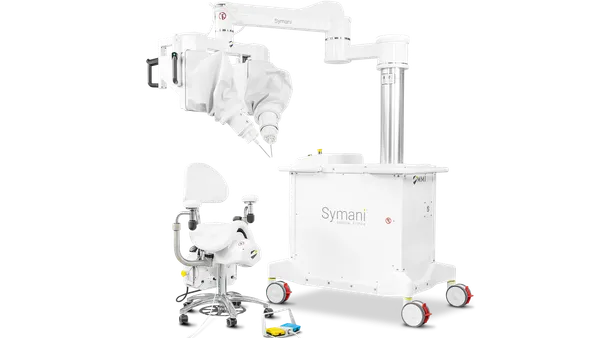Dive Brief:
- Medtronic's renal denervation system proved effective at reducing blood pressure in patients with uncontrolled hypertension not treated with medication, in three-month results from the SPYRAL HTN-OFF MED pivotal trial presented this weekend at the virtual American College of Cardiology meeting.
- The device, intended to regulate overactivity of nerves to the kidneys, met its primary and secondary endpoints in the study comparing results in patients who received the treatment to those who underwent a sham procedure, Medtronic announced.
- The 331-patient study, published in The Lancet, showed a 9.2 mm Hg reduction in patients’ systolic blood pressure measured in the doctor's office and 4.7 mm Hg reduction in 24-hour systolic ambulatory blood pressure in patients treated with the Symplicity Spyral system.
Dive Insight:
The success is a victory for a program the medtech giant has committed to pursuing despite a major setback in 2014 when the device failed to show effectiveness in another study. The company believes renal denervation represents a big opportunity, noting in a presentation to investors coinciding with the virtual ACC meeting that the market could be as large as $1 billion by 2026.
Hypertension increases the risk of stroke, heart attack, heart failure, atrial fibrillation and renal failure, yet the condition is uncontrolled in 65% of patients despite the availability of pharmacologic treatments, according to the company.
In its study data presented at ACC, Medtronic's renal denervation procedure lowered blood pressure during the day and through the night, when cardiovascular risks rise. Patients who received the catheter-based treatment had no major procedure-related adverse events through the three-month period.
“This study establishes renal denervation as an additional option beyond exercise or lifestyle modification for patients with high blood pressure who are unwilling to take or cannot tolerate medication,” study author Michael Böhm of Saarland University Medical Center in Hamburg, Germany, said in an ACC statement.
Patients in the study had an average age of 53, not on any blood pressure-reducing medications and whose average systolic blood pressure over 24 hours was between 140 and 170mm Hg.
Medtronic said it recently gained a breakthrough device designation from FDA for the system. The company plans to submit results from the study, along with data from a companion study in its application seeking FDA approval for the device.
The second trial, now paused due to the coronavirus outbreak, is testing safety and effectiveness of renal denervation in patients taking up to three blood pressure-reducing medications. The system would be the first renal denervation device approved for use in the U.S.







